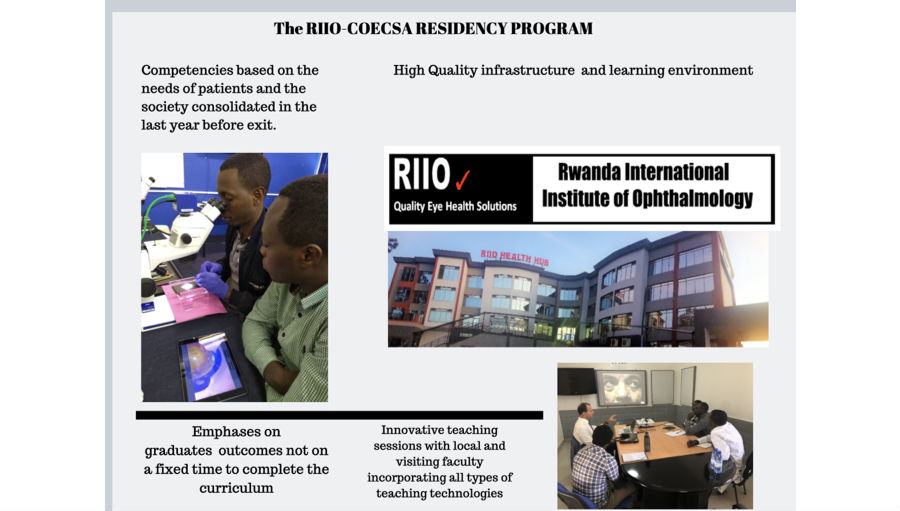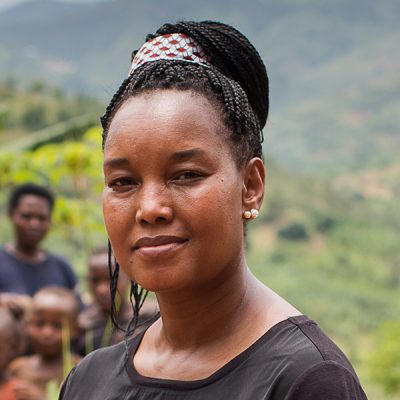Join a powerful, unprecedented alliance for better eye health for all.
Join IAPB-
Choose an alternate language here

The Rwanda International Institute of Ophthalmology (RIIO) is registered as a local not for profit organisation in Rwanda. The Principal themes of operation that are included in its MOU with the Ministry of Health in Rwanda include delivering:
In line with the second objective the RIIO School of Ophthalmology was set up to train ophthalmologists starting in May 2018. Currently every ophthalmologist in Rwanda has been trained outside the country and returns with very different levels of competence. The request from the MOH was to deliver a programme that produces ophthalmologists who can hit the ground running after qualification and not need supplementary training as has been the trend.
The founders of RIIO are senior ophthalmologists who have always been passionate about skills transfer. RIIO developed a residency programme by leveraging on key resources available in the region while avoiding the pitfalls that existing programmes often have to navigate. The College of Ophthalmology of Eastern Central and Southern Africa (COECSA) us a professional college that has accredited our programme and will certify our graduates. One key resource we leveraged on, was the development of a robust competence-based curriculum by COECSA with support from the Royal College of Ophthalmologists. This was a great starting point for RIIO. We blended the best from various curricula into the COECSA curriculum and developed what is essentially a blend of Competence and Outcome based approaches. Our trainees are expected to master defined skills at the learner’s pace rather than within a specific period of time- we measure student learning rather than time. RIIO faculty participated in COECSA’s training the trainers programme and learnt how to define clear expected outcomes for trainees, how to make valid and reliable assessments to support the curriculum as well as monitor training milestones. We established high and challenging standards of performance and supported this by expanding opportunities of learning; for example the first cohort attended cataract surgery simulation training at the University of Cape Town for example very early in their training.
Due to the acute shortage of trainers in Rwanda we rely heavily on more experienced visiting faculty from world renowned institutions and have a specific memorandum of support with Wills Eye Hospital Centre for Academic Global Ophthalmology. Besides regular visits by faculty from WillsEye, in the past one year our students have received instruction from faculty from Nairobi University, Stanford University, the Centre d’Application de DESSO (CADESSO) , University of Cincinnati, University of Rwanda, University of Ireland and Hope University Burundi. The visiting faculty point out areas where we need to improve and expand the learning exposure for our residents.
However every ophthalmologist in Rwanda is invited to engage with our programme either as visiting faculty or as preceptors hosting our residents for elective rotations. We value this input greatly.
We deploy technology at all levels with in-class technologies for both trainees and faculty including Socrative, e-learning platforms, virtually reality and simulations. Our trainees take mandatory online courses, attend faculty moderated webinars and use resources like CyberSight with specific outcomes expected. In order to ensure that international level of acquisition of specific knowledge is being achieved, our trainees are expected to pass the ICO Visual Sciences, Optics, Refraction and Instruments as well as the Clinical Sciences exams within four years. The first cohort of 4 residents to our delight, all passed the first 2 exams at first attempt scoring well above the global average.
Our course is not based at a university but rather trainees are certified by a professional college, COECSA. This allows us more flexibility in training and eases the pressure of university bureaucracy such as dictating on student numbers and adherence to calendars. Our private sub specialty hospital allows access to the latest technologies and subspecialties for our training while our unique “adopt a district hospital” model where RIIO gets space at a public hospital and equips it as well as runs it allows access to real life clinics for our trainees.
Our local trainees get a training post from the Ministry of health (our greatest supporter) while the international trainees rely on monthly stipends for their living allowances. Funds for running the department come entirely from tuition fees. We are grateful to organisations that have supported our trainees such as the Fred Hollows Foundation whose support has been immense, Leonardo del Vecchio Foundation and CBM as well as organisations that support our visiting faculty costs and infrastructure development such as Dr Agarwal’s Eye Hospital , SEE International, Wills CAGO, Orbis International and Himalayan Cataract Project.

We are the first institution in the region that is not running an MMed programme as the exit qualification for ophthalmologists but are aiming for a dual COECSA and ICO fellowship. However, our trainees have defined research outcomes to achieve including producing publications before they graduate, presenting work at conferences. Research seminars are held right from year one. The first cohort has already participated in a school vision screening project in Rwanda and presented posters at the recent COECSA conference.
In the traditional sense we have a training curriculum that we can cover in three years. The fourth year of our program will allow us to focus on outcomes instead of the process, and the RIIO School of Ophthalmology goal is to graduate a more predictable product of residency training capable on day 1 of performing the work required of him by the society. We currently have 10 residents in training from Rwanda, Burundi and the Democratic Republic of Congo. We will double the number of ophthalmologists in Rwanda within 10 years and contribute to the gaps in neighbouring countries especially the French speaking ones who find it comfortable to train at RIIO where colleagues are bilingual. We are grateful to all those organisations that have believed in our vision and supported us, we are eager to learn from those more experienced than us while also being ready to stretch beyond the current normal to reach our goal.